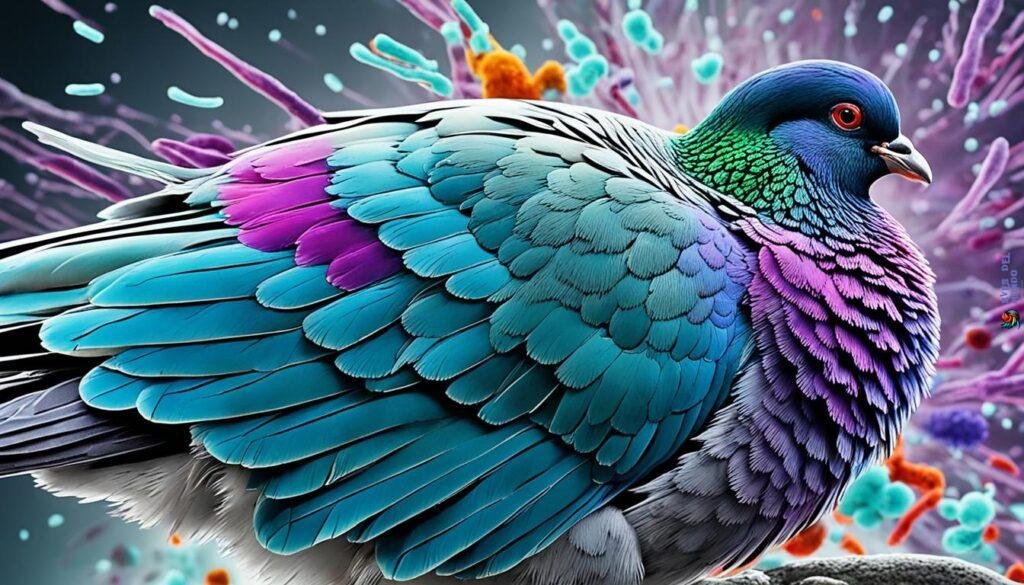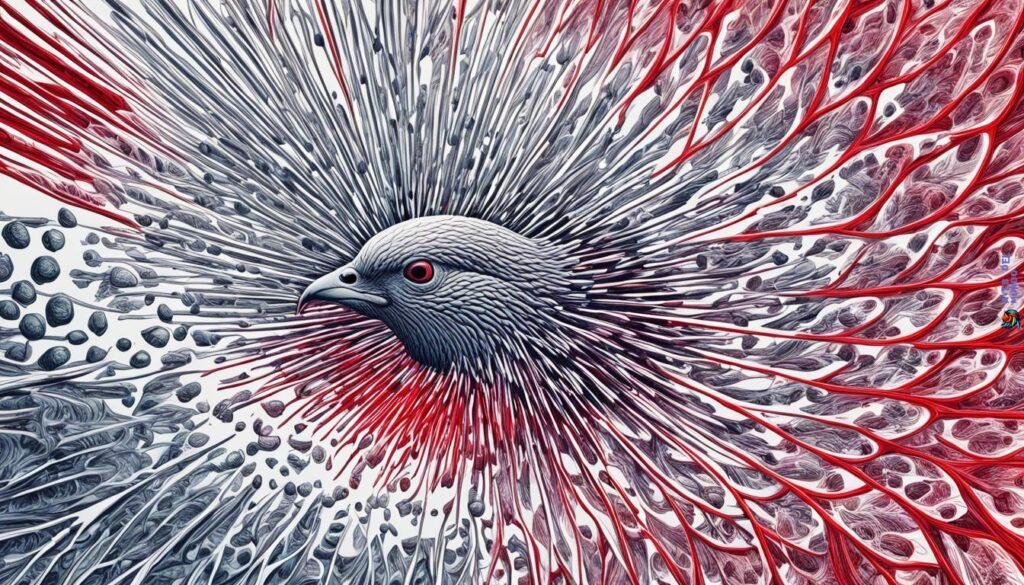An alarming 80% of dove species, including pigeons, may carry or die from various diseases. This high number highlights the need for more awareness on pigeon illnesses. What do we call pigeon disease, and how does it affect urban ecosystems and even our health? The main disease we talk about is Pigeon Paramyxovirus type-1 (PPMV-1). It worries bird lovers and researchers because of its severe effects on pigeons.
Pigeon ailments affect both wild and pet birds. Learning about these diseases helps us understand urban wildlife better. It also shows how diseases can spread between different species. Let’s dive into the world of avian health to know more about these diseases, their names, and their broader impacts.
What is Pigeon Disease Called?
Many people who love pigeons worry about disease. Knowing about these diseases is key for keeping pigeons healthy. We will explore some common diseases, what they do, and how they affect pigeons all over the world.
Understanding Pigeon Paramyxovirus Type-1 (PPMV-1)
Pigeon Paramyxovirus type-1 is known for causing nervous system problems. Symptoms like circling, shaking, and paralysis show how serious it is. It’s vital to act quickly because it can kill many birds in a flock.
Overview of Avian Influenza in Pigeons
Avian Influenza affects pigeons in complex ways. Some viruses don’t hit them hard, but others can cause breathing issues and diarrhea. These signs mean the infection is attacking pigeon health.
Unpacking Newcastle Disease Virus (NDV) in Pigeons
The Newcastle disease virus shows how connected bird diseases are. Infected pigeons might be weak or have gut problems and neck twisting. These symptoms are alarming for people who care for pigeons.
| Disease | Common Symptoms | Potential Impact on Flocks |
|---|---|---|
| Pigeon Paramyxovirus type-1 (PPMV-1) | Neurological signs (circling, tremors, paralysis) | High morbidity and mortality rates |
| Avian Influenza | Respiratory distress, diarrhea | Varied resistance, potential for significant health decline |
| Newcastle Disease Virus (NDV) | Somber mood, gastrointestinal issues, neurological disturbances | Severe symptoms with a risk of rapid spread |
Seeing disease in your pigeons can be scary. But knowing and learning about their health is very important. Recognizing symptoms of diseases like PPMV-1, Avian Influenza, and NDV early is crucial for protecting your birds.
Common Pigeon Diseases and Their Symptoms
Knowing the pigeon illness symptoms is key to keeping your pigeons healthy. Common pigeon diseases show various signs affecting their brains, stomachs, and lungs. Here, we’ll outline these diseases and their symptoms to help you keep an eye on your pigeon’s health.
Neurological symptoms can suggest viral attacks, like Pigeon Paramyxovirus type-1 (PPMV-1) or Avian Influenza (AIV). These cause wing shaking, confusion, and sometimes paralysis. Gut problems could mean bacterial infections, such as E. coli or Salmonella spp., shown by diarrhea. Respiratory issues might hint at Avian Influenza. Meanwhile, Newcastle Disease Virus (NDV) can hit various parts of the body.
| Disease | Neurological Symptoms | Gastrointestinal Symptoms | Respiratory Symptoms |
|---|---|---|---|
| PPMV-1 | Disorientation, Trembling, Paralysis | Occasional diarrhea | Gasping, Coughing |
| E. coli | Rare | Diarrhea, Weight Loss | Nasal Discharge |
| Salmonella spp. | None typically observed | Diarrhea, Weight Loss | Tachypnea (rapid breathing) |
| Avian Influenza | Mild Tremors | Diarrhea | Coughing, Sneezing |
| NDV | Twisting Neck, Paralysis | Diarrhea | Respiratory Distress, Sneezing |
Watching for signs of pigeon ailments aids in catching diseases early. Seeing any symptoms means it’s time to talk to a bird vet. They can examine your pigeons and suggest the best treatment.
How Bacterial Infections Manifest in Pigeons
Knowing how bacterial infections affect pigeons is key for those who care for them. We’ll look at common bacteria, their symptoms, and how they impact pigeon health. This information helps both amateurs and professionals.

E. coli and Salmonella spp. in Pigeons: What to Know
Bacterial infections in pigeons often involve E. coli. This bacteria can cause diseases ranging from mild to very serious, like septicemia. Pigeons can carry E. coli without getting sick, making it hard to stop the infection from spreading. Salmonella spp. is another big threat, leading to different types of infections. Some birds can carry Salmonella without showing signs, which increases the risk of spreading the bacteria to people and other animals.
Staphylococcus aureus and Its Effects on Pigeons
Staphylococcus aureus lives on pigeons without causing problems until certain conditions make it harmful. Then, it can cause deep infections and abscesses. Knowing the signs of Staphylococcus aureus effects on pigeons helps in treating it quickly. This stops the disease from spreading among pigeons.
The Role of Pseudomonas aeruginosa in Pigeon Ailments
Pseudomonas aeruginosa shows up in pigeons mostly when their immune system is weak or they are already sick with something else, like E. coli. It’s tough because it doesn’t respond well to antibiotics. This bacteria can lead to many health problems, from small infections to serious illnesses. It’s important to keep an eye on pigeon health to catch this early.
| Bacterial Pathogen | Commonly Affected Organs | Treatment Considerations |
|---|---|---|
| E. coli | Gastrointestinal tract, liver, respiratory system | Antibiotic sensitivity testing, supportive care |
| Salmonella spp. | Gastrointestinal tract, liver, spleen | Vaccination in some cases, stringent sanitation |
| Staphylococcus aureus | Skin, mucous membranes, sometimes bones | Targeted antibiotic therapy, hygiene improvement |
| Pseudomonas aeruginosa | Multiple organs, often in conjunction with wounds | Addressing underlying health issues, using effective antibiotics |
For pigeon lovers, knowing about these bacterial infections in pigeons means you can prevent them. Keeping the loft clean, feeding pigeons properly, and getting a vet’s help when a bird seems sick are key. These actions keep your pigeons safe from common bacteria.
The Significance of Viral Diseases in Pigeon Health
Keeping pigeons healthy is tough because of viral diseases. These problems can spread fast and affect many birds. It’s vital to know how these diseases impact pigeons worldwide.
Viruses like the West Nile Virus in pigeons spread quickly. We must understand the risks and how to keep our birds safe from these dangers.
The Global Impact of Avian Diseases on Pigeons
Pigeon health reflects the health of birds all over the world. They travel far and can catch many diseases. This shows the global impact of avian diseases on both wild and domestic birds.
West Nile Virus and Pigeon Vulnerability
Pigeons can carry the West Nile Virus but aren’t its main target. They can be both affected by and spread the virus. It’s important to watch their health to stop the virus from spreading.
Emerging Viral Threats to Pigeons
Global trade and climate change bring new viruses. These risks are growing for pigeons. Diseases like the Third gyrovirus species are becoming more common. We need to be prepared for these emerging viral threats to pigeons.
Pigeon Ailments and Zoonotic Risks
If you enjoy birds or live in the city, it’s important to know about pigeon illnesses. These diseases can affect both birds and people in cities and towns. Pigeons close to us may carry germs, which could be harmful.
It’s key to understand the range of diseases pigeons can spread. They may not show symptoms but can carry diseases like Chlamydophila psittaci, which affects humans too. Avian Influenza is another disease pigeons can carry, which has caused concern before. While pigeons rarely spread this virus to people, the possibility exists. Pigeon paramyxoviruses also pose a risk of disease spreading between species, though it’s uncommon.
In places where pigeons and people are close, taking steps to prevent disease is necessary. Watching pigeon flocks for illness, vaccinating them, and controlling their numbers can help. This makes cities safer for everyone.
| Disease | Zoonotic Risk Level | Common Indicators in Pigeons | Prevention Measures |
|---|---|---|---|
| Psittacosis (Chlamydophila psittaci) | Moderate | Lethargy, Respiratory Distress | Sanitary Loft Practices |
| Avian Influenza | Low to Moderate (Species Dependent) | Respiratory Signs, Diarrhea | Vaccination, Population Control |
| Pigeon Paramyxovirus | Low | Neurological Signs, Partial Paralysis | Surveillance, Vaccination |
You play a big role in reducing zoonotic risks from pigeon diseases. Being aware of pigeon illnesses and keeping places clean can make a big difference. We can make our cities healthier for people and pigeons together.
Diagnosing Pigeon Illness: Key Methods and Techniques
Diagnosing pigeon illness requires knowing different methods. Let’s look at crop flush, microscopy, and staining techniques. They help identify pigeon diseases. Blood tests are also key for checking pigeon health.

Crop Flush and Microscopy in Pigeon Disease Identification
The crop flush in pigeons is a starting point for diagnosis. It’s great for finding Trichomonas gallinae, also known as canker. A crop flush sample goes under a microscope to spot these protozoa.
Microscopy doesn’t just find parasites. It also checks the bird’s overall cell health.
How Gram Stain and Diff-Quik Techniques Aid Diagnosis
Gram Stain and Diff-Quik enhance microscopic exams. These staining methods help tell bacteria apart, crucial for Gram Stain in pigeon diagnosis. They guide vets to choose the right antibiotic. The Diff-Quik technique speeds up detecting blood parasites and checking cell shapes.
Understanding Blood Tests and Their Role in Pigeon Healthcare
Blood tests are vital for diagnosing pigeon illnesses. Pigeon blood tests tell vets about the bird’s organ functions. They help rule out certain diseases. These tests show blood cell numbers and types, hinting at diseases or infections.
| Diagnostic Method | Uses | Benefits |
|---|---|---|
| Crop Flush | Collection of samples from the bird’s crop | Ideal for detecting canker and other protozoa |
| Microscopy | Observation of cellular structures and parasites | Allows for a close-up look at the bird’s cells and potential infectious agents |
| Gram Stain | Identification of bacterial cell wall properties | Helps choose the most effective antibiotic therapy |
| Diff-Quik Technique | Rapid staining to assess blood parasites and morphology | Quick results, on-the-spot initial diagnosis |
| Blood Tests | Evaluation of organ functions, infection indicators | Extensive overview of the bird’s overall health status |
These techniques give a full picture for diagnosing pigeon illnesses. An accurate, fast diagnosis means better care and health for pigeons.
The Impact of Infectious Agents on Pigeon Neurology
Understanding how infectious agents affect pigeon neurology is key for bird lovers and avian health experts. In pigeons, signs of neurological problems often point to bigger health issues. Recognizing and acting on these signs quickly is essential for the well-being of these birds. Neurological symptoms can include various behaviors and signs that show how their nervous system is doing.
Pigeon Paramyxovirus type-1 (PPMV-1), for instance, causes serious neurological symptoms like confusion, circling, and even total paralysis. For anyone who looks after pigeons, spotting these symptoms early can help provide better care. This is true for both professionals and hobbyists.
- Neurological Symptoms in Pigeons: Keep an eye on your pigeons for symptoms like loss of balance, weird head tilt, or clumsy movements. These could be signs of neurological issues caused by infections.
- Brain Tissue Examination: If a pigeon is really unwell, a vet might suggest looking at their brain after they’ve passed. This can reveal problems like bleeding in the brain.
- Bacterial Infections: Some bacterial infections, especially those caused by E. coli, Salmonella, and Pseudomonas, can lead to neurological problems in pigeons. This shows the connection between infections and pigeon neurology.
If we pay close attention and take good care, we can manage the negative effects of these infectious agents.
For those interested in more details about how these diseases affect pigeon neurology, there’s a lot of information available. Scientific articles and avian vet resources have in-depth info. They discuss the symptoms and how to diagnose these diseases.
Finally, it’s critical for those who take care of pigeons to watch for neurological problems. This helps fight the spread and harm of infections. It ensures pigeons live happier lives and helps prevent disease outbreaks that can hit many birds. Regular checks and seeing a vet when needed are key to looking after pigeon neurology well.
Prevention Strategies for Common Pigeon Health Issues
Managing pigeon health well comes down to a few important actions. These actions focus on preventing diseases and keeping pigeons healthy. It’s key for pigeon lovers to use vaccines, clean habitats, and good food together.
Vaccinations and Their Efficacy in Pigeon Disease Prevention
Vaccines are crucial in protecting pigeons from diseases. They now include shots for PPMV-1 and NDV, thanks to advances in bird medicine. Keeping up with vaccination times is central to strong pigeon health defenses.
Sanitation and Loft Management Best Practices
Keeping pigeon lofts clean is essential for stopping disease. This means cleaning every day and doing deep cleans often. Good cleaning practices stop diseases before they can start.
Diet and Nutrition: Enhancing Pigeon Immunity
A balanced diet is vital for pigeon health. It lays the foundation for a strong immune system. Choosing the right seeds, grains, and supplements fills their nutritional needs well.
| Disease | Vaccine Available | Sanitation Practice | Dietary Support |
|---|---|---|---|
| PPMV-1 | Yes | Daily loft cleaning | Protein-rich seeds |
| NDV | Yes | Periodic disinfection | Vitamin supplements |
| Parasitic Infections | No | Parasite control measures | Regular deworming |
Treating Pigeon Diseases: Antibiotics and Antiviral Medications
Treating pigeon diseases requires understanding the many ailments they may face. Bacterial infections, often caused by E. coli, Salmonella, and Staphylococcus, are common. For these, pigeon antibiotics are key. Before giving antibiotics, it’s important to test and find the most effective one.
Viral infections offer a different hurdle since there aren’t as many treatments. However, antiviral medications for pigeons can help against PPMV-1 and NDV. The main aim is to ease symptoms and lower the virus numbers. This means helping the pigeon stay hydrated, well-fed, and stress-free.
You must pay close attention to the precise condition affecting your pigeon, as the type of medication will vary greatly between bacterial and viral diseases.
Here’s a quick look at treatment strategies:
- Bacterial Infections: Identify the bacteria with tests and choose the right antibiotics.
- Viral Infections: Support the bird and use antiviral meds when possible to ease symptoms and stop the virus from spreading to other pigeons.
Using medications wrongly can cause resistance. Always seek a vet’s advice when treating pigeon diseases. A mix of good care, close monitoring, and doctor visits is the best way to keep your pigeons well.
Research on Pigeon Ailment Name: Latest Findings
Avian medicine is making big steps in research on pigeon ailments. We now understand more about pigeon diseases. This helps vets and bird lovers keep pigeons healthy.
Exciting finds in virology have led to changes in disease names as we discover new pathogens. Identifying new viral strains means we must update disease names. This keeps everyone in the avian health field on the same page.
With each new discovery comes a greater understanding of the intricate balance of pigeon health and the challenges faced in diagnosing and treating these creatures. Our collective awareness grows, enabling more accurate disease prevention and control measures.
New research links symptoms with causes through careful science. For example, a new virus might change how we categorize a disease. This helps doctors treat pigeons better by being clearer and more precise.
| Recent Research Highlights | Impact on Pigeon Health |
|---|---|
| New viral strain identification | Potential for improved diagnostics and vaccine development |
| Revision of disease nomenclature | Enhanced global communication about pigeon diseases |
| Linking observed symptoms to specific pathogens | More accurate diagnosis and treatment |
| Study of bacterial and viral co-infections | Insights into complex disease dynamics |
Using new research helps those caring for pigeons stop infections and boost flock health. It means we must keep learning and using what we discover.
Keeping up with the fast pace of pigeon disease research is crucial. Changes in pigeon disease naming and new treatments help us care for pigeons better. Thanks to research on pigeon ailments, pigeons can live happier and healthier lives.
Understanding the Role of Clinics in Pigeon Disease Management
Pigeon lovers and caretakers know how vital clinics are for pigeon health. The experts at these clinics know how to spot and treat diseases quickly and accurately. They use methods like crop flush and microscopy to keep pigeons healthy.
Going to these clinics helps not just in treating but also in preventing illnesses. They use tests to find the problem and then treat it with the right medicines. This stops diseases from spreading in your birds. Vaccines also protect them from common diseases.
Clinics also guide you in taking care of your pigeons well. They offer advice on creating a good living space and feeding your pigeons right. This helps keep your pigeons strong and healthy. Overall, clinics are key in keeping pigeons well and happy.



